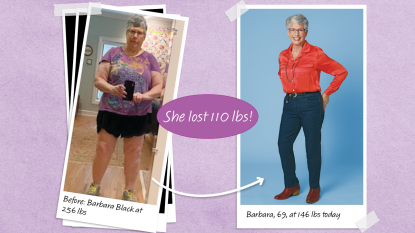Feeling Unheard by Your Doctors? 6 Tips to Get Them to Listen to You

Have you gone to the doctor, only to leave feeling unheard and frustrated? l The average physical exam is just 15 minutes — and doctors interrupt us after only 11 seconds. Here, easy ways to ensure your voice is heard.
Be a ‘mama bear.’
Doctors don’t listen as well to women, studies reveal. That’s why it’s important to name all your symptoms, says expert Pamela Gallin, M.D. “Most women discount physical discomfort or emotional lack of well-being,” she reveals. “For example, if you have thyroid issues, sluggishness may be an obvious symptom, but if the front of your leg hurts, you wouldn’t know that can be related.”
Instead of saying to your doctor, “It might seem small, but…” flip that and say, “I want you to know that X is bothering me and it’s not a small thing.” Dr. Gallin advises: “Be a mama bear — for you.”
Bring a list.
As soon as we walk into a doctor’s office, our blood pressure goes up and it’s hard to think, says Dr. Gallin, who advises preparing a list of concerns beforehand, such as “‘I’m worried X medication will cause…’ “When you show them your list, they’ll have to answer.”
The one point many often forget to raise: How do you ask questions after the visit? “Every office is different — some only use email; others have hours when you can call. They won’t volunteer this, so just ask.”
Map your timeline.
Doctors are taught to think linearly and put symptoms in a sequence. But patients naturally jump around when telling their story, says expert Cindi Gatton. “Simply step back and create a timeline, such as, ‘I noticed in April, when I walked uphill, I couldn’t catch my breath; in May, I started a new supplement.’” Then let your doctor ask questions like, “When you took X supplement, what happened?” This simple step gives your doctor an easyto-follow “map” to treat you.
Share energy drains.
Women are experiencing epic levels of exhaustion. But it can be hard to describe what that feels like. “Just focus on four points,” urges Dr. Gallin. “Has there been a change in when you’re tired? Is there anything that reverses it? Does it ever go away? Is it expanding? Fatigue can help diagnose underlying issues, from Lyme disease to hyperthyroidism. Everyone’s tired is different, so share yours.”
Dodge disconnects.
Miscommunication happens when doctors speak quickly and use jargon. “They may say you have hypertension,” says Gatton.
“You might not know that’s just another word for high blood pressure.” Don’t be afraid to ask your doctor to define medical terms; they will happily clarify.
Trust your gut.
“All patients should be empowered to say, ‘I just don’t feel like you’re hearing me,’” assures expert Lisa Sanders, M.D. “And if you come in with a vague problem, ask, ‘What else do you think it might be?’ Every doctor should have a backup because there’s rarely just one answer.” After all, you and your doctor are a team, and communicating openly will ensure the care you deserve.
Our expert panel
Pamela F. Gallin, M.D., patient advocate and clinical professor of ophthalmology at NY Presbyterian Columbia, is on all the National Best Doctor lists.
Cindi Gatton is the founder of and principal and advocate at Pathfinder Patient Advocacy Group ® , an independent patient advocacy practice based in Atlanta.
Lisa Sanders, M.D., associate professor of internal medicine and education at Yale School of Medicine, writes the Diagnosis column for The New York Times.
A version of this article originally appeared in our print magazine, Woman’s World.













